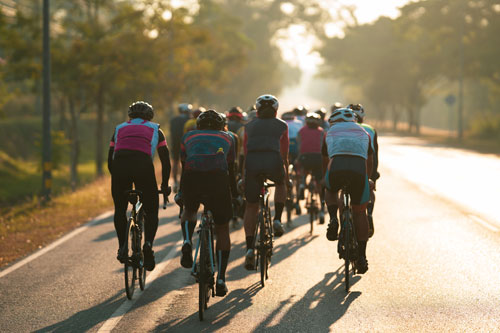Bayes insurance and risk academic urges road cycling safety improvements in wake of pro-cyclist’s death
An academic who published research revealing professional cycling’s ‘safety problem’ last year has urged the sport to act after the tragic death of Norwegian cyclist Andre Drege during the Tour of Austria.
The 25 year old died last weekend in a high speed descent estimated to be between 80 -100km/h.
Dr Cormac Bryce, a Senior Lecturer in Insurance and Risk at Bayes Business School, City, University of London, said the tragedy was another reminder that the UCI has a “safety problem”.
“The sport is caught up in the historical romanticism of what was once deemed acceptable from a risk tolerance perspective. Pain and suffering are considered part of the DNA of the sport and sometimes that is used to justify a lassiez-faire approach to rider safety and welfare. That can be shown in route design, protection from traffic furniture, weather protocols, or safety standards that ensure reliability of equipment.
“However, many sports – from the NFL to the cash-soaked world of Formula 1 – have recognised that reducing risk does not have to involve removing the excitement and drama of a sport.”
The weekend’s tragedy follows the death of a 26 year old cyclist, Gino Mader, in the Tour de Suisse last year and a number of other high-profile accidents that have endangered the lives of cyclists, fellow competitors and spectators in both the track and road disciplines.
Dr Bryce assessed one of those incidents, which saw an Australian cyclist tumble to the track when his handlebars snapped during the team pursuit at the 2021 Tokyo Olympic Games, in his research published last year.
Rules should reflect faster speeds
He continued: “The status-quo cannot continue. The UCI must introduce specific rules and standards of equipment safety that reflect the actual risks professional road cyclists face. For too long the commercial interests of manufacturers and lack of oversight by the UCI have left riders unnecessarily exposed to risk – guinea pigs in the equipment innovation arms race. The unintended consequences of weak regulation and commercial interests have plagued industrial accidents from BP Deepwater Horizon to the Boeing 737-Max.”
“So long as descending is part of the sport, all stakeholders in the cycling family have a duty to look for additional innovations to make this inherently risky element safer. No stone should be left unturned, from equipment through to preventative measures applied in course design on descents.”
“This year Formula 1 is marking the 30th anniversary of Ayrton Senna’s death at the notoriously hazardous Imola circuit in San Merino. Senna’s death ushered in a wave of safety improvements to save the sport from itself. Is it too much to hope that in 30 years we will look back and see the tragedy and Andre Drege and Gino Mader in the same light?”
